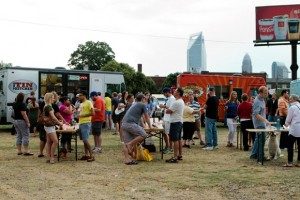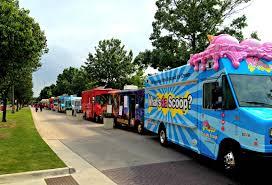
The food truck industry is booming in 2017. All over the country, food trucks are popping up serving everything from fish tacos to barbecue sandwiches, to even Thai food. Because of this explosion in the food truck industry, more and more companies are needing insurance coverage for their new food truck businesses. Workers’ compensation insurance is regulated by the individual states, so it is important to check with the proper governing body in your state to ensure if you are required to purchase workers comp coverage. If you own and operate your food truck it may not be worthwhile to purchase coverage, but if you have multiple trucks or do not operate your truck yourself all the time it may well be worthwhile to purchase coverage for your employees.

Work comp exposures come from slips, falls, cuts, burns, heavy lifting, along with interactions with guests. Food service employees tend to be minimum wage and turnover is high. Employees should be trained on proper safety techniques for cooking and serving food. This training should be specific to food trucks. Do not assume because someone has experience working in a traditional restaurant that they know they procedures for food trucks. In order to save on coverage it is a good idea to offer incentives that encourage safety in the workplace and long-term employment. These show positive signs of management control. When these are in place, carriers are much more likely to offer credits or discounts on coverage and they are more likely not to raise or rate when a claim does occur.
|
Industry Classes Included in Our Restaurant/Bar Programs
| Class Codes |
Brief Business Description of Operations we Cover |
| 9082 |
Restaurants with a traditional wait staff often belong in this code unless they can, otherwise, be classified into another code due to unique aspects of their business such the percentage of alcohol sold, catering, entertainment, etc. Traditional restaurants typically have servers who wait on the customer and receive gratuity or tips. |
| 9083 |
Fast food restaurant will typically fall under this classification unless state specific rules require an alternate code. These types of restaurants could include standard fast food providers serving hamburgers, tacos, pizza, and sandwiches. Gratuity is generally not expected with fast food. |
| 9084 |
Restaurants who receive more than 50% of their revenue from the sale of alcoholic beverages such as beer, wine, or liquor typically belong in the 9084 classification. This class is often used for bars, nightclubs, lounges, taverns, etc. |
| 9058 |
Restaurants that are owned or operated in or by hotels will typically fall under class code 9058. For hotels, this code will often includes servers, cooks, kitchen help, bartenders, and managers. It may also include musicians and entertainers. |
| 9053 |
Applies in CA, NJ, and OK. May include restaurant or tavern employees located in clubs such as swimming, tennis, and fitness clubs. |
| 9079 |
Applies in CA, MA, NJ, OR, and TX. Depending on the state, this code could apply to vending, restaurants, bars, taverns, caterers, dance halls, and hotels. |
| 9072 |
Applies to NY only. Includes fast food restaurants. |
| 9071 |
Applies to NY only. Includes full service restaurants, buffets, diners, and other establishments providing wait service. May include musicians. |
|

